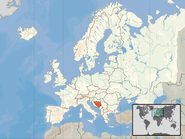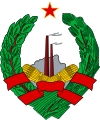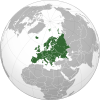
Back بوابة:البوسنة والهرسك Arabic Portal:Bosna i Hercegovina BS Portál:Bosna a Hercegovina Czech Portal:Bosnien und Herzegowina German Portal:Bosnia y Herzegovina Spanish Portail:Bosnie-Herzégovine French Պորտալ:Բոսնիա և Հերցեգովինա Armenian Portale:Bosnia ed Erzegovina Italian Портал:Босния және Герцеговина Kazakh Портал:Босна и Херцеговина Macedonian
Welcome to the Bosnia and Herzegovina Portal
 |
 |

| |
Bosnia and Herzegovina (Serbo-Croatian: Bosna i Hercegovina, Босна и Херцеговина), sometimes known as Bosnia-Herzegovina and informally as Bosnia, is a country in Southeast Europe, situated on the Balkan Peninsula. It borders Serbia to the east, Montenegro to the southeast, and Croatia to the north and southwest. In the south it has a 20 kilometres (12 miles) long coast on the Adriatic Sea, with the town of Neum being its only access to the sea. Bosnia has a moderate continental climate with hot summers and cold, snowy winters. In the central and eastern regions, the geography is mountainous, in the northwest it is moderately hilly, and in the northeast it is predominantly flat. Herzegovina, the smaller, southern region, has a Mediterranean climate and is mostly mountainous. Sarajevo is the capital and the largest city.
The area has been inhabited since at least the Upper Paleolithic, but evidence suggests that during the Neolithic age, permanent human settlements were established, including those that belonged to the Butmir, Kakanj, and Vučedol cultures. After the arrival of the first Indo-Europeans, the area was populated by several Illyrian and Celtic civilizations. The ancestors of the South Slavic peoples that populate the area today arrived during the 6th through the 9th century. In the 12th century, the Banate of Bosnia was established; by the 14th century, this had evolved into the Kingdom of Bosnia. In the mid-15th century, it was annexed into the Ottoman Empire, under whose rule it remained until the late 19th century; the Ottomans brought Islam to the region. From the late 19th century until World War I, the country was annexed into the Austro-Hungarian monarchy. In the interwar period, Bosnia and Herzegovina was part of the Kingdom of Yugoslavia. After World War II, it was granted full republic status in the newly formed Socialist Federal Republic of Yugoslavia. In 1992, following the breakup of Yugoslavia, the republic proclaimed independence. This was followed by the Bosnian War, which lasted until late 1995 and ended with the signing of the Dayton Agreement.
The country is home to three main ethnic groups: Bosniaks are the largest group, Serbs the second-largest, and Croats the third-largest. Minorities include Jews, Roma, Albanians, Montenegrins, Ukrainians and Turks. Bosnia and Herzegovina has a bicameral legislature and a three-member presidency made up of one member from each of the three major ethnic groups. However, the central government's power is highly limited, as the country is largely decentralized. It comprises two autonomous entities—the Federation of Bosnia and Herzegovina and Republika Srpska—and a third unit, the Brčko District, which is governed by its own local government.
Bosnia and Herzegovina is a developing country and ranks 74th in the Human Development Index. Its economy is dominated by industry and agriculture, followed by tourism and the service sector. Tourism has increased significantly in recent years. The country has a social-security and universal-healthcare system, and primary and secondary level education is free. It is a member of the UN, the Organization for Security and Co-operation in Europe, the Council of Europe, the Partnership for Peace, and the Central European Free Trade Agreement; it is also a founding member of the Union for the Mediterranean, established in July 2008. Bosnia and Herzegovina is an EU candidate country and has also been a candidate for NATO membership since April 2010. (Full article...)
Selected article -

Operation Southern Move (Croatian: Operacija Južni potez) was the final Croatian Army (HV) and Croatian Defence Council (HVO) offensive of the Bosnian War. It took place in western Bosnia and Herzegovina on 8–11 October 1995. Its goal was to help the Army of the Republic of Bosnia and Herzegovina (ARBiH) whose positions around the town of Ključ, captured by them during Operation Sana, were endangered by a counteroffensive by the Army of Republika Srpska (VRS). The objectives of Operation Southern Move included the capture of the town of Mrkonjić Grad and positions on the Manjača Mountain which would allow the HV and the HVO to directly threaten Banja Luka, the largest city controlled by Bosnian Serbs. Finally, the offensive was also aimed at capturing the Bočac Hydroelectric Power Station, the last significant source of electricity under VRS control in western Bosnia and Herzegovina. The combined HV and HVO forces were under the overall command of HV Major General Ante Gotovina.
The offensive achieved its objectives, and significantly contributed, along with Operations Sana and Maestral 2 to forcing the Bosnian Serb leadership to serious peace negotiations. The offensive also contributed to the displacement of 10,000 Bosnian Serb refugees and resulted in the deaths of at least 181 Serbs while hundreds more went missing following the operation. A country-wide ceasefire came into effect on 12 October, one day after the offensive ended, and was soon followed by negotiations which produced the Dayton Agreement, ending the Bosnian War. (Full article...)General images
More did you know
- ...that NATO pilots flew more than 100,000 sorties over Bosnia during Operation Deny Flight?
Cities
- Banja Luka
- Bihać
- Berkovići
- Bijeljina
- Bosanska Krupa
- Bosanski Petrovac
- Brčko
- Brod
- Bugojno
- Cajnice
- Cazin
- Derventa
- Doboj
- Donji Vakuf
- Dubica
- Foča
- Goražde
- Gornji Vakuf
- Gračanica
- Gradačac
- Gradiška
- Ilidža
- Istočno Sarajevo
- Jajce
- Jablanica
- Kakanj
- Kalesija
- Konjic
- Kotor Varoš
- Laktaši
- Livno
- Ljubuški
- Lukavac
- Modriča
- Mostar
- Nevesinje
- Neum
- Novi Grad
- Novi Travnik
- Olovo
- Petrovo
- Prijedor
- Prnjavor
- Sanski Most
- Sarajevo
- Srebrenik
- Srebrenica
- Teslić
- Tešanj
- Travnik
- Trebinje
- Tuzla
- Velika Kladuša
- Visoko
- Vitez
- Zavidovići
- Zenica
- Zvornik
- Živinice
- Žepče
Selected biography -
Marija Bursać (Serbian Cyrillic: Марија Бурсаћ; 2 August 1920 – 23 September 1943) was a member of the Yugoslav Partisans during World War II in Yugoslavia and the first woman proclaimed a People's Hero of Yugoslavia. Bursać was born to a Bosnian Serb farming family in the village of Kamenica, near Drvar. After the invasion of Yugoslavia by the Axis powers and their creation of the Independent State of Croatia in April 1941, Bursać supported the Partisan resistance movement led by the Communist Party of Yugoslavia (KPJ). Like other women in her village, she collected food, clothing, and other supplies for the Partisan war effort. Bursać became a member of the League of Communist Youth of Yugoslavia in September 1941. The following August she was appointed political commissar of a company of the 1st Krajina Agricultural Shock Brigade, which harvested crops in the Sanica River valley, and was admitted to the KPJ at the end of that summer.
Bursać became a Partisan in February 1943, joining the newly formed 10th Krajina Brigade. With the brigade, she fought in the Bosansko Grahovo, Knin, Vrlika and Livno areas and served as a nurse. In September 1943, Bursać was wounded in the leg while throwing hand grenades during an attack on the German base at Prkosi in northwestern Bosnia. As she was being transported to a field hospital at Vidovo Selo, she sang Partisan songs. Bursać's wound soon developed gangrene, and she died at the hospital on 23 September 1943. She was proclaimed a People's Hero of Yugoslavia the following month. Schools, streets and organisations were named in her memory following the war, commemorating her service to the Partisan cause. (Full article...)List of selected biographies
|
|---|
Did you know (auto-generated)

- ... that a Socialist Youth League candidate in the 1990 Bosnian general election registered his ethnicity as 'Eskimo' as an apparent protest against ethnic registry requirements for candidates?
- ... that Ivan Ančić was the first Bosnian Franciscan to use the Latin script to write in his native language?
Subcategories
Related portals
Religions in Bosnia and Herzegovina
Ex-Yugoslav countries
Other countries
Topics
Recognized content
Things you can do

- Request images:
- Request maps:
- Sarajevo city location map
- Articles wanted:
- Clinical Center University of Sarajevo (Koševo hospital);
- Articles needing major work, Be Bold!: **
- Architecture of Bosnia and Herzegovina
- Health in Bosnia and Herzegovina
- Literature of Bosnia and Herzegovina
- List of universities in Bosnia and Herzegovina
- Foreign relations of Bosnia and Herzegovina
- Cinema of Bosnia and Herzegovina
- Subpages of List of settlements in the Federation of Bosnia and Herzegovina
- Stubs needing expansion:
- Featured Portals:
- Featured Pictures:
- Articles with Featured Article Candidate's status within reach:
- Current Featured Candidates:
- Featured Articles: (Don't be too bold!)
- Current Good Article Candidates:
- Good Articles:
- Former Good Articles:
Web resources
- B&H Tourism - Official Web Site
- Tourism Association of the Federation of Bosnia and Herzegovina - Official Web Site
- Tourism Association of Republika Srpska - Official Web Site
- Duga-Tehna
Other links:
- Bosnian National Monument - Muslibegovica House
- "Bosnia and Herzegovina". The World Factbook (2024 ed.). Central Intelligence Agency.
- Bosnia & Herzegovina Economy
- Bosnia and Herzegovina Map
- Bosnia News
- rjecnik.ba English-Bosnian and German-Bosnian On-line Dictionary (in Bosnian, English, and German)
- The State of Media Freedom in Bosnia and Herzegovina: The Public Service Broadcasting Report by the OSCE Representative on Freedom of the Media
Associated Wikimedia
The following Wikimedia Foundation sister projects provide more on this subject:
-
Commons
Free media repository -
Wikibooks
Free textbooks and manuals -
Wikidata
Free knowledge base -
Wikinews
Free-content news -
Wikiquote
Collection of quotations -
Wikisource
Free-content library -
Wikiversity
Free learning tools -
Wikivoyage
Free travel guide -
Wiktionary
Dictionary and thesaurus
© MMXXIII Rich X Search. We shall prevail. All rights reserved. Rich X Search














































































